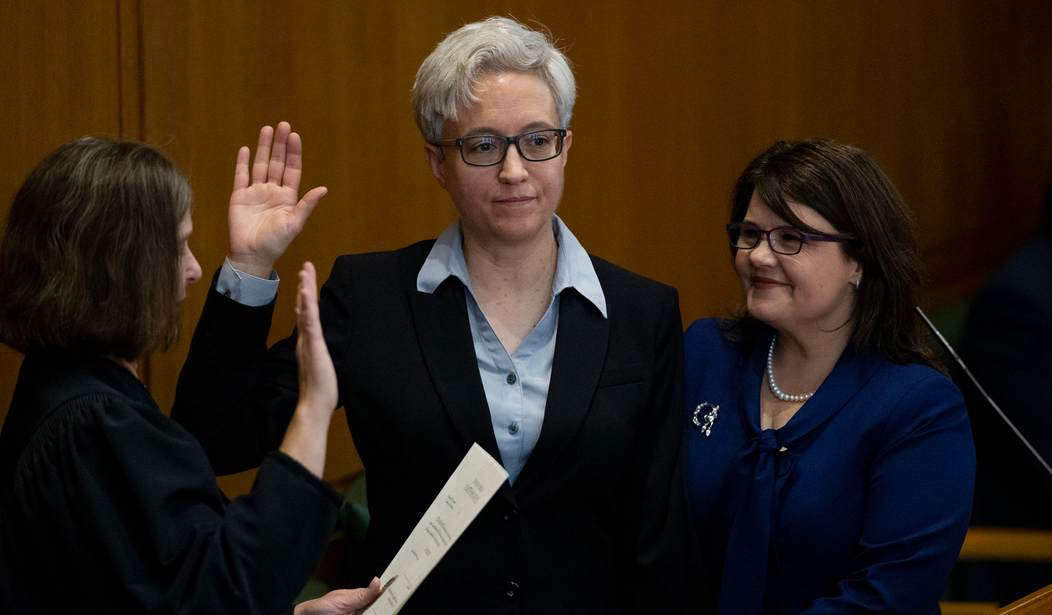Last month, Gov. Tina Kotek said she would accept the recommendations of a task force put in place over the summer to study how best to help Portland recover from its host of problems. The solutions recommended by the task force were really just common sense. The city would need to hire more police and put an end to open air drug use. In short, Portland would undo some of the things it had done to itself in 2020. That’s when the city voted to defund police and the state voted for Measure 110 which legalized hard drugs, including fentanyl.
Having accepted the plan to correct these failures last month, this week Gov. Kotek and Mayor Wheeler jointly announced a 90-day drug emergency in the city.
Oregon Gov. Tina Kotek, Multnomah County Chair Jessica Vega Pederson and Portland Mayor Ted Wheeler each made an emergency declaration to address the public health and public safety crisis in Portland’s Central City, citing overdoses, deaths and fear driven by fentanyl use, according to a Tuesday press release.
“Our country and our state have never seen a drug this deadly and addictive, and all are grappling with how to respond,” Kotek said in the release.
Oregon voters passed Measure 110 in 2020, which decriminalized some use of hard-drugs, including fentanyl, a potent synthetic opioid. The measure has received criticism, as opioid overdose deaths steadily climbed since.
Opioid overdose deaths in the state increased from 280 in 2019 to 956 in 2022, according to the state’s data.
Again, the story here is that progressive voters in the state are utopian dreamers with no common sense. Legalizing drugs has made the use of drugs far more common and, not surprisingly, a lot more people are dying as a result. A moderately smart 7-year-old could have predicted this but not the majority of Oregon voters.
So what will this emergency actually accomplish? It will create a new downtown command center, which sounds like less of a command center and more of a linkage center. It will also slightly increase police patrols looking for drug dealers. But as for metrics for success, well there aren’t any.
People addicted to fentanyl who interact with first responders in Portland’s downtown in the next 90 days will be triaged by this new command center. Staff can connect people with various resources from a bed in a drug treatment center to meeting with a behavioral health clinician to help with registering for food stamps…
The effort also extends the Portland Police Bureau’s partnership with Oregon State Police to jointly patrol downtown streets for fentanyl sales. It additionally kicks off information campaigns centered on drug use prevention and recovery programs across the region. The county will expand outreach and training on how to administer Narcan, an overdose-reversal drug.
The program doesn’t establish any goals to measure success. Kotek said the next 90 days will provide a road map for the next steps.
Forgive me for sounding cynical, but a 90-day emergency with no goals and no metrics sounds like a PR exercise to me. Three months from now the mayor and the governor can proclaim it a big success with no fear of contradiction. Generally speaking, all of the media coverage of this effort seems a bit too credulous. Kudos to the NY Times for at least pinning the tail on the donkey, so to speak.
Many cities are struggling with the fallout from fentanyl. In Oregon, the problem was accelerated by a law voters passed in 2020 that decriminalized the use of so-called hard drugs, including methamphetamine and fentanyl, and not just marijuana, which was already legal in Oregon and many other states. At the time of its passage, Measure 110 was celebrated as a first-in-the-nation law, an attempt to recognize drug addiction as a health problem, not a crime.
Under this law, Measure 110, the police are supposed to refer people they see using fentanyl to treatment, and not send them to jail. But, in reality, many fentanyl users have ignored these referrals and continue to use the drug openly in parks, on city buses and in front of restaurants with impunity.
Liberal elected officials in many U.S. cities have been wary about returning to policies of the past that focused on arresting and jailing drug addicts rather than getting them into treatment.
But in many of those cities, widespread disorder has alienated even liberal-minded voters, forcing leaders to take a harder-line approach.
Progressives created this mess and now it’s so bad that even some lefties are sick of it. Whether they are sick enough of it to change things fundamentally it remains to be seen. The article goes on to say that while there probably won’t be much opposition to this emergency declaration, there probably will be pushback once Gov. Kotek tries to actually overturn Measure 110. In other words, just because this has been an obvious disaster doesn’t necessarily mean that Oregon progressives have learned their lesson.







Join the conversation as a VIP Member